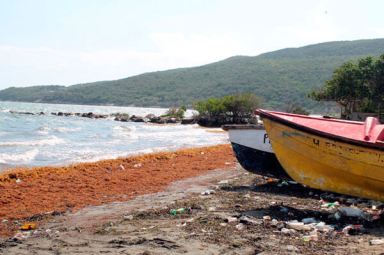From annoying seaweed to vehicle fuel: Turning ocean waste into sustainable energy

Regional governments, the tourism and hospitality sector, and the private sector may soon find it fitting to thank the University of the West Indies campus in Barbados and several postgraduate students for showing how the Caribbean can convert the tons of sargassum seaweed that wash up on shores almost every day to commercial uses.
The campus recently unveiled what is being billed as one of the planet’s first vehicles to use seaweed as fuel in combination with rum distillery wastewater and sargassum-based biomethane to prove that these vehicles can be operated successfully and that the time is fast approaching when the region should no longer regard seaweed as an annoying nuisance. It is harmful to the tourism industry and blankets beaches, letting off a pungent odor.
An upstart outfit, spearheaded by Rum and Sargassum Inc., is pioneering the project under Legena Henry’s (PHD) supervision of the Renewable Energy Development Laboratory at the Cave Hill Campus in Barbados. She is collaborating with several post-grad students on the project that has already received some seed funding from the IDB, The Caribbean Centre for Renewable Energy and Energy Efficiency (CCREEE), The UWI, NGC Green Company Limited, the National Petroleum Corporation, the Caribbean Climate-Smart Accelerator, TOSL Engineering Limited, and RL Mark & Company among others.
At a public launching ceremony late last month, Henry praised the University for its support. “UWI Cave Hill Campus is really an incubator for creativity and innovation. Why I celebrate Cave Hill so much is because Barbados is a creative society, and we are leading the region right now in the energy transition. The launch of the bio-CNG vehicle would not have been possible without The CCREEE, which offered the use of its electric car for the test drive. It is now the flagship vehicle bearing the slogan ‘Runs on Sargassum,’” she said.
Other dignitaries spoke about a future with vehicles running on the new fuel mix, offering less pollution to a planet whose climate is changing fast, according to experts. “Dr. Henry is, firstly, leveraging her research on how to convert sargassum into biofuel to create value in society by tackling this pernicious environmental scourge,” Professor campus Principal Professor Clive Landis said. “She is creating value for the university itself because the Cave Hill Campus is an equity partner in the venture, taking an idea through the so-called tech transfer funnel all the way from the point of conception to the successful pilot stage that we have witnessed today, the point at which it is ready for scale-up and investment, takes persistence and determination.”
He said the school also focused on commercial seaweed uses, including diabetes treatment and pest control.
Meanwhile, Minister of Energy Lisa Cummings said Barbados has about 150,000 vehicles using fossil fuels, and the day might come when more are powered by alternative energy. “Electrification and the use of renewables in transportation are critical for our energy transition. The project has the potential to change the hearts and minds of the Barbadian public regarding transitioning to renewable. This is a regional and a global first-mover opportunity. Barbados has pioneered a technology that can change the way the entire Caribbean treats transportation, and I want us to not take that for granted,” she said.




